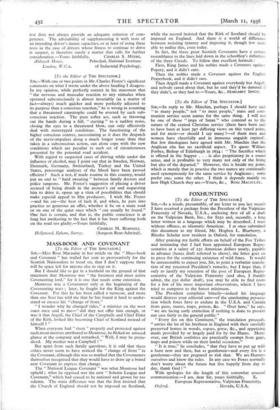MASS - BOOK AND COVENANT [To the Editor of THE SPECTATOR.] SIR,—Miss
Rose Macaulay in her article on the " Mass-book and Covenant " has trailed her coat so provocatively for the Scottish Nationalists to tread on, that I don't suppose there will be space left for anyone else to step on it.
But I should like to get in a foothold on the ground of that statement that Montrose was " the foremost and most active Covenanting lord," for it is one that needs some extension.
Montrose was a Covenanter only at the beginning of the Covenanting wars ; later, he fought for the King against the Covenant. For this he has been called a turncoat, and more than one Scot has told me that he has found it hard to under- stand or excuse his "change of front."
" I wonder why he changed• sides," a minister on the west coast once said to me—" did they not offer him enough, or was it that Argyll, the Chief of the Campbells and Chief Elder of the Kirk, looked like becoming Chief of Scotland instead of himself ? "
When everyone had " risen " properly and protested against such mean motives attributed to Montrose, he flicked an amused glance at the company and remarked, " Well, I may be preju- diced. My mother was a Campbell ! "
But apart from such family questions, it is odd that these critics never seem to have noticed the " change of front " in the Covenant, although this was so marked that the Covenanters themselves recognised that they would have to draw up a brand new Covenant to express that change.
The " National League Covenant " was what Montrose had upheld ; what he opposed was the new " Solemn League and Covenant," which had ceased to be national and grown far too solemn. The main difference was that the first insisted that the Church of England should not be imposed on Scotland,
while the second insisted that the Kirk of Scotland should be imposed on England. And there is a world of difference between resisting tyranny and imposing it, though few seem able to realise this, even today.
In fact, the three great Scottish Covenants have a certain resemblance to the lines laid down in the schoolboy's definitio:. of the three Creeds. To follow that excellent formula :
First, King James and his nobles made a Covenant against Popery, and it didn't care.
Then the nobles made a Covenant against the English Prayerbook, and it didn't care.
Then Argyll made a Covenant against everybody but Argyll, and nobody cared about that, but he said they'd be damned if they didn't, so they had to.—Yours, &c., MARGARET IRWIN.










































 Previous page
Previous page